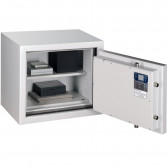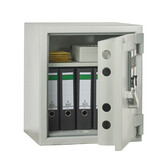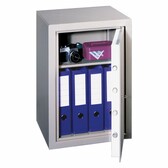We protect our home and valuables from thieves, not realising that often the perpetrators of theft are not outsiders, but our loved ones - children, grandchildren or siblings. Who steals in the family, why and how to protect yourself against such a situation?
Who steals most often in the family?
Police statistics show that grandparents who are robbed by their grandchildren are the most frequent victims of theft. In the Podkarpacie region alone, there are a dozen or so such cases annually[i]. Thefts between siblings are also quite frequent. In general, minors are very often stealing in families, whose share in the total number of thefts in Poland in 2014 was 7.3%. Interestingly, theft in the family does not only concern poor homes at all. On the contrary, they occur more often in wealthy families, and the pretext for stealing a few hundred zlotys from parents may even be that they refused to buy another computer game.
Domestic theft – why so common?
First of all, because we are not afraid of our own family. It is hard for us to imagine that our nearest and dearest could be so disrespectful and dishonest as to steal from us. We trust our nearest and dearest, but unfortunately they sometimes neglect that trust. A lack of concern is the reason why possessions are not secured. We keep valuables in the bedroom in a case that is not even locked with a regular key, and cash in the bar in a pile, without regularly counting it. And even if it suddenly seems to us that there is 200 or 300 zlotys less in this pile, we will sooner say that we forgot about an expense than accuse our own child or partner of theft. Lack of security means creating ideal conditions for the other person to be tempted and take something they shouldn't have. It is not for nothing that they say that opportunity makes the thief. If our child has debts they don't want to talk about (such as gambling), access to unsecured cash can push them to steal more quickly.
Grain for grain until you get it right – theft that goes unnoticed
There is another problem with thefts that occur within the family – a rather low rate of recording them. On the one hand, families do not report such cases to the police because they are embarrassed and, despite everything, unwilling to harm their child or grandchild. On the other hand, the fact that a grandchild steals money or valuables may not be noticed for a long time. If valuables (e.g. jewellery) are stored in the home in an unsecured manner, but nobody looks into them (e.g. a ring case that the grandmother no longer wears), their absence may only be noticed years later.
The home safe – the best protection
The simplest solution is a home safe. However, this cannot be a safe whose location and method of opening are well known to everyone. In such a situation, the safe no longer fulfils its protective function and is only a protection against thieves from the outside. The safe should be installed in a place that is inaccessible to other household members, and if this is not possible, the code to the safe must certainly be concealed from them. For valuables and cash, tubular safes that can be mounted in the wall or the floor work well. If this is not possible, you can opt for a furniture safe or a burglar-proof safe, but be sure to fix it to the structure of your wardrobe or structural elements.
How do I hide the access code from my family? This is psychologically quite a difficult task, because if your partner or adult son asks for the code to the safe, refusing to give it may result in conflict. A rather interesting solution in this situation is to give the code to family members and ask them to report any need for access to the safe (this can be explained by security rules and the fact that it would be good for one person to know what is in the safe at all times). Once the code has been given, it must then be changed to one that no one can access. In this situation, if someone tries to steal and get into the safe, they will not succeed anyway, and the likelihood of them admitting it is small (so both conflict and theft are avoided). A simpler way is to use a fingerprint biometric lock on the safe, because then without explaining to anyone, only the owner of the safe can open it, and passing the code is not possible.
Check: home safes at Hartmann Tresore
[i] http://www.nowiny24.pl/wiadomosci/podkarpacie/art/6125771,ze-zlodziejem-pod-jednym-dachem-dzieci-okradaja-rodziny,id,t.html
You may find it interesting: Theft during weddings
World Saving Day – why is it better to celebrate it instead of Halloween?
Poles prefer cash to a bank account. How to safely store money at home?





